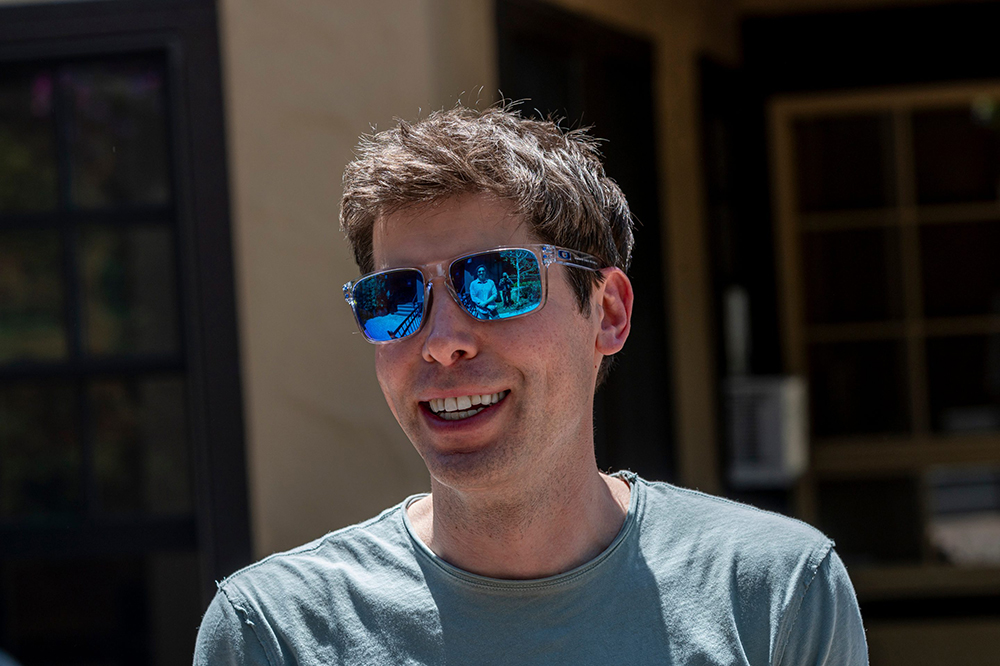
加密貨幣曾經在金融領域的炒作熱度大多已經被人工智能所占據。如今有一個項目試圖將兩種技術結合起來。該項目被稱為世界幣(Worldcoin),旨在為人工智能機器人與人類變得更加難以區分的世界構建一個全球性的數字身份網絡。這一服務的用戶通過掃描眼球來創建數字證書,并獲得世界幣代幣獎勵——不過美國公民無法獲得這種加密貨幣。目前已有超過200萬人注冊了世界身份(World ID),這反映出世界幣的創新報酬機制具有相當的吸引力,而其創始人之一山姆·奧特曼也有著良好的聲譽。山姆·奧特曼是著名ChatGPT聊天機器人服務開發商OpenAI的首席執行官。然而,國際監管機構早期的審查以及一些數據安全問題卻引發了爭議,并且有可能會減緩世界幣的發展勢頭。
1.什么是世界幣?
該項目使用了一個稱之為“眼球”(orb)的設備——它看起來像一個神奇8號球,但更大且呈銀色——來掃描人的虹膜(像指紋一樣,每個人的虹膜也都有獨特的圖案)。這樣就會創建一個世界身份,為持有者提供“人格證明”,使其可以在接受各種在線服務時驗證自己的身份,而不會暴露姓名或其他個人數據。世界幣同時也是用于獎勵進行眼球掃描或支持該項目用戶的加密貨幣的名稱。世界幣基金會(Worldcoin Foundation)被列為世界幣技術的管理機構,但其組織者表示,這一技術沒有所有者或股東,世界幣代幣的持有者對該項目的發展方向擁有發言權。世界幣還是一家名為Tools for Humanity Corp.的科技公司的下屬機構,但該公司表示它的“成立是為了加速世界幣向更公平的經濟體系的過渡”。
2.世界幣為何如此令人興奮?
世界幣有望融合兩個當下最熱門的金融趨勢:人工智能和加密貨幣。有觀點認為,隨著人工智能越來越普及,為了區分人類和AI驅動的智能軟件,世界身份的需求將會增大。另一個重要原因是該項目有ChatGPT代言人奧特曼的參與。2022年11月,人工智能聊天機器人面市,自此便激起了公眾對人工智能潛力的想象。
3.世界幣引發了什么爭議?
目前有幾個方面存在爭議。其一,世界幣正在創建代幣來酬報掃描眼球的參與者(不包括美國及其他被排除在外的國家的公民)。其次,該項目早期的幾位投資者在去年的加密貨幣崩盤中受到了牽連,其中包括FTX創始人薩姆·班克曼·弗里德,現在他正被軟禁在家并且面臨欺詐指控。麻省理工科技評論(MIT Technology Review)的一項調查顯示,有證據表明,世界幣采取了所謂的具有欺騙性和剝削性的措施來吸引印度尼西亞、加納和智利等國的參與者。這一項目正受到歐洲的審查,因其收集生物識別數據的做法可能違反了一些國家的隱私法。此外,一些世界幣運營商在注冊新用戶時被盜取登錄憑證以及黑市銷售世界身份的問題也層出不窮。對此,世界幣表示已經升級了安全系統。
4.有人使用世界幣嗎?
截至7月底,世界幣已經為210多萬人注冊并創建了數字身份,盡管其中絕大多數身份證書都是在7月24日世界幣正式上線之前發行的。相關的加密貨幣價格出現了波動。正式上線當天,世界幣代幣的價格幾乎翻了一番,高達3.58美元,不過一周后又跌至1.92美元的低位。但CoinMarketCap的數據顯示,世界幣的總市值在7月31日仍達到了2.67億美元。
5.山姆·奧特曼是誰?
38歲的奧特曼是一位經驗豐富的企業家。除了領導OpenAI之外,他還長期擔任創業加速器Y Combinator的總裁,而且還投資了愛彼迎(Airbnb)、Stripe、多寶箱(Dropbox)和Instacart等公司。此外,奧特曼還是智能手機定位服務商Loopt的聯合創始人。
6.為何美國公民無法獲得世界幣代幣?
奧特曼表示,世界幣不會給美國及其他一些加密貨幣監管法規搖擺不定或曖昧不明的國家的公民提供代幣。事實上,近幾年除世界幣外還有眾多加密貨幣項目選擇避開美國市場,因為美國的監管者和立法者至今沒有明確哪些代幣應該歸類為證券,哪些不應該。美國證券交易委員會(U.S. Securities and Exchange Commission)的主席加里·根斯勒很早就表示大部分代幣都屬于證券。但一起備受關注的法律案件中,法官卻在今年7月裁定Ripple Labs Inc.的XRP幣代幣只有在出售給機構投資者時才屬于證券,而通過交易所出售給散戶投資者時則不屬于。這使得該問題懸而未決。更多的訴訟和監管舉措肯定會隨之而來,因此加密貨幣的發行者面臨著不確定性。(財富中文網)
譯者:中慧言-劉嘉歡
加密貨幣曾經在金融領域的炒作熱度大多已經被人工智能所占據。如今有一個項目試圖將兩種技術結合起來。該項目被稱為世界幣(Worldcoin),旨在為人工智能機器人與人類變得更加難以區分的世界構建一個全球性的數字身份網絡。這一服務的用戶通過掃描眼球來創建數字證書,并獲得世界幣代幣獎勵——不過美國公民無法獲得這種加密貨幣。目前已有超過200萬人注冊了世界身份(World ID),這反映出世界幣的創新報酬機制具有相當的吸引力,而其創始人之一山姆·奧特曼也有著良好的聲譽。山姆·奧特曼是著名ChatGPT聊天機器人服務開發商OpenAI的首席執行官。然而,國際監管機構早期的審查以及一些數據安全問題卻引發了爭議,并且有可能會減緩世界幣的發展勢頭。
1.什么是世界幣?
該項目使用了一個稱之為“眼球”(orb)的設備——它看起來像一個神奇8號球,但更大且呈銀色——來掃描人的虹膜(像指紋一樣,每個人的虹膜也都有獨特的圖案)。這樣就會創建一個世界身份,為持有者提供“人格證明”,使其可以在接受各種在線服務時驗證自己的身份,而不會暴露姓名或其他個人數據。世界幣同時也是用于獎勵進行眼球掃描或支持該項目用戶的加密貨幣的名稱。世界幣基金會(Worldcoin Foundation)被列為世界幣技術的管理機構,但其組織者表示,這一技術沒有所有者或股東,世界幣代幣的持有者對該項目的發展方向擁有發言權。世界幣還是一家名為Tools for Humanity Corp.的科技公司的下屬機構,但該公司表示它的“成立是為了加速世界幣向更公平的經濟體系的過渡”。
2.世界幣為何如此令人興奮?
世界幣有望融合兩個當下最熱門的金融趨勢:人工智能和加密貨幣。有觀點認為,隨著人工智能越來越普及,為了區分人類和AI驅動的智能軟件,世界身份的需求將會增大。另一個重要原因是該項目有ChatGPT代言人奧特曼的參與。2022年11月,人工智能聊天機器人面市,自此便激起了公眾對人工智能潛力的想象。
3.世界幣引發了什么爭議?
目前有幾個方面存在爭議。其一,世界幣正在創建代幣來酬報掃描眼球的參與者(不包括美國及其他被排除在外的國家的公民)。其次,該項目早期的幾位投資者在去年的加密貨幣崩盤中受到了牽連,其中包括FTX創始人薩姆·班克曼·弗里德,現在他正被軟禁在家并且面臨欺詐指控。麻省理工科技評論(MIT Technology Review)的一項調查顯示,有證據表明,世界幣采取了所謂的具有欺騙性和剝削性的措施來吸引印度尼西亞、加納和智利等國的參與者。這一項目正受到歐洲的審查,因其收集生物識別數據的做法可能違反了一些國家的隱私法。此外,一些世界幣運營商在注冊新用戶時被盜取登錄憑證以及黑市銷售世界身份的問題也層出不窮。對此,世界幣表示已經升級了安全系統。
4.有人使用世界幣嗎?
截至7月底,世界幣已經為210多萬人注冊并創建了數字身份,盡管其中絕大多數身份證書都是在7月24日世界幣正式上線之前發行的。相關的加密貨幣價格出現了波動。正式上線當天,世界幣代幣的價格幾乎翻了一番,高達3.58美元,不過一周后又跌至1.92美元的低位。但CoinMarketCap的數據顯示,世界幣的總市值在7月31日仍達到了2.67億美元。
5.山姆·奧特曼是誰?
38歲的奧特曼是一位經驗豐富的企業家。除了領導OpenAI之外,他還長期擔任創業加速器Y Combinator的總裁,而且還投資了愛彼迎(Airbnb)、Stripe、多寶箱(Dropbox)和Instacart等公司。此外,奧特曼還是智能手機定位服務商Loopt的聯合創始人。
6.為何美國公民無法獲得世界幣代幣?
奧特曼表示,世界幣不會給美國及其他一些加密貨幣監管法規搖擺不定或曖昧不明的國家的公民提供代幣。事實上,近幾年除世界幣外還有眾多加密貨幣項目選擇避開美國市場,因為美國的監管者和立法者至今沒有明確哪些代幣應該歸類為證券,哪些不應該。美國證券交易委員會(U.S. Securities and Exchange Commission)的主席加里·根斯勒很早就表示大部分代幣都屬于證券。但一起備受關注的法律案件中,法官卻在今年7月裁定Ripple Labs Inc.的XRP幣代幣只有在出售給機構投資者時才屬于證券,而通過交易所出售給散戶投資者時則不屬于。這使得該問題懸而未決。更多的訴訟和監管舉措肯定會隨之而來,因此加密貨幣的發行者面臨著不確定性。(財富中文網)
譯者:中慧言-劉嘉歡
Artificial intelligence has taken over much of the financial hype cycle that used to belong to cryptocurrency. Now comes a project that’s trying to combine the two. Called Worldcoin, it’s an effort to create a global network of digital identities for a world in which AI robots become harder to distinguish from humans. Users of the service scan their eyeballs to create digital credentials and are rewarded with Worldcoin tokens — though the cryptocurrency isn’t available in the US. More than 2 million people have signed up for a World ID, a reflection of the novel compensation model and the reputation of one of its founders, Sam Altman, the chief executive officer of OpenAI, which created the popular ChatGPT chatbot service. But early scrutiny by international regulators and some data security problems have stirred controversy and threatened to slow Worldcoin’s momentum.
1. What is Worldcoin?
The project uses a device called an “orb” — which looks like a Magic 8 Ball but bigger and silver-colored — to scan a person’s iris, which has a unique pattern in every human much as a fingerprint does. That creates a World ID, which grants its holders “proof of personhood” — a way to verify their identities on various online services without disclosing their name or other personal data. Worldcoin is also the name of the cryptocurrency that’s used to reward people who scan their eyeballs or who support the project. The Worldcoin Foundation is listed as the steward of the technology, but the organizers say that it has no owners or shareholders and that holders of Worldcoin tokens will have a say in the direction of the project. Worldcoin is also affiliated with a tech company called Tools for Humanity Corp. that says it was “established to accelerate the transition towards a more just economic system.”
2. Why is there so much excitement about Worldcoin?
Worldcoin is promising to link two of the hottest contemporary financial trends: artificial intelligence and crypto. As AI becomes more popular, the argument goes, World ID will become more needed, to help distinguish between humans and AI-powered smart software. Another big reason for the build-up is the involvement of Altman, who’s the public face of ChatGPT. The AI chatbot was introduced in November 2022 and ignited the public’s imagination about what artificial intelligence can do.
3. What’s the controversy with Worldcoin?
There are several. One is that it’s creating tokens to compensate participants outside the US and the other excluded countries who scan their iris. Also, several of the project’s early backers were swept up in last year’s crypto collapse, including FTX founder Sam Bankman-Fried, who’s under house arrest and facing fraud charges. An MIT Technology Review investigation found evidence of what it called deceptive and exploitative practices used by Worldcoin to attract participants in countries such as Indonesia, Ghana and Chile. The project is being scrutinized in Europe for its collection of biometric data, which may run afoul of some countries’ privacy laws. There have also been issues with the theft of login credentials from some Worldcoin operators who were signing up new users, and with black-market sales of World IDs. Worldcoin said it upgraded its security in response.
4. Is anyone using it?
The project had registered and created digital identities for more than 2.1 million people by the end of July, though the vast majority of those were issued before the official July 24 launch. The related cryptocurrency has fluctuated. The price of a Worldcoin token roughly doubled on that day to as high as $3.58 before dropping to as low as $1.92 a week later. But Worldcoin still had a total market capitalization of $267 million on July 31, according to CoinMarketCap.
5. Who is Sam Altman?
Altman, 38, is a seasoned entrepreneur. In addition to leading OpenAI, he was the longtime president of Y Combinator, the startup accelerator, and has investments in Airbnb, Stripe, Dropbox and Instacart. He also co-founded Loopt, a smartphone-location service.
6. Why are Worldcoin tokens not available in the US?
Altman has said the project wouldn’t offer tokens in the US and in some other countries where the regulatory rules regarding crypto were either uncertain or unclear. Indeed, Worldcoin is among many crypto projects that have chosen to stay out of the US market in recent years as US regulators and lawmakers continue to grapple with which coins are classified securities and which ones aren’t. Gary Gensler, the chairman of the US Securities and Exchange Commission, had long said that most coins were securities. But in a closely followed legal case, a judge ruled in July that Ripple Labs Inc.’s XRP token is a security only when it’s sold to institutional investors but not when it’s sold to retail investors via exchanges. That left the matter unsettled. More litigation and regulation are sure to follow, leaving crypto issuers with uncertainty.






